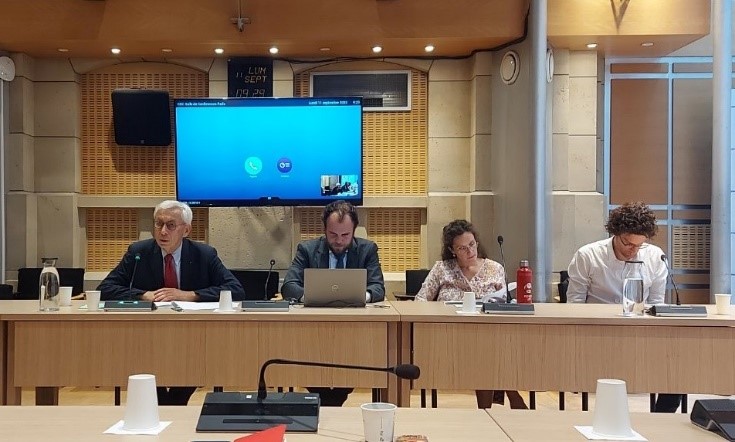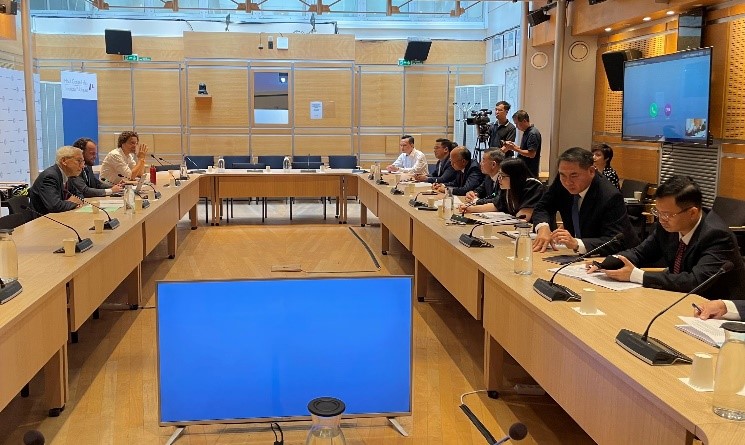On September 11, at the headquarters of the French Cour des Comptes (in Paris), the delegation of the State Audit of Viet Nam (SAV) led by Auditor General Ngo Van Tuan engaged in an experience-sharing meeting with the French Cour des Comptes.

The scene of the meeting
During the meeting, the two agencies delved into discussions and exchanged valuable insights on anti-corruption audit, measures to improve the effectiveness of anti-corruption audit and the evaluation of public policies and programs.
Auditor General Ngo Van Tuan informed colleagues from the French Cour des Comptes that anti-corruption audits constitute a critical mandate of SAV during the current period. Over past five years, SAV has issued 610 audit reports containing recommendations to address collective and individual accountability related to violations and irregularities uncovered through audit activities.
SAV has transferred 23 cases with signs of corruption and crime to police investigation agencies for investigation and handling in accordance with legal provisions; 1,456 audit reports and related documents to agencies of the National Assembly, the Central Committee for Inspection of the Communist Party of Viet Nam, investigation agencies and other competent state agencies for further investigation, inspection and supervision.
The French Cour des Comptes commended SAV for its remarkable achievements. They highlighted their own role in ensuring the proper, economical and effective use of public funds through the implementation of 04 missions: judging, controlling, evaluating and certifying.
The Cour des Comptes is responsible for issuing judgments on the settlement of personal accounts, verifying the accuracy of all sources of income and expenditure, and confirming the regularity of the checked accounts. Accordingly, issuing a "Notice of liability exemption for individual civil servants" or a "Declaration of financial liability" when violations are detected.
Driven by the goal of ensuring proper, efficient and economical use of public funds, the Cour des Comptes scrutinizes the adequacy of management activities in accordance with laws and regulations (both French and European Union) to ensure resources are used or mobilized in the most effective manner.
The Cour des Comptes assesses whether results of an activity achieve its predetermined objectives. Simultaneously, the Court evaluates and exercises controls over public policies or specific agencies. When these policies span both national and local levels, the Court collaborates with the 23 regional/territorial Chamber of Accounts to conduct joint reviews. The goal is to provide reliable insights into the financial healthn of the State and social security accounts.
Representing the French Cour des Comptes, Ms. Dominique Dujols, Senior counsellor, expressed her strong admiration for SAV's achievements and expertise in anti-corruption audit, and shared many professional lessons in anti-corruption audit of the French Cour des Comptes in recent years.

The scene of the meeting
Elaborating on SAV's experience in auditing and evaluating public policies and programs, Mr. Vu Ngoc Tuan, Director General of the Department of General Affairs, highlighted the SAV's recent audits of key government policies. These included: Socio-economic recovery and development program; National target programs such as New Rural Development Program, Sustainable Development and Poverty Reduction Program, Socio-Economic Development of the Ethnic Minorities and Mountainous Areas; Covid-19 Pandemic Prevention and Control Program and related support policies; Social Housing policy,...
Audit results, conclusions, and recommendations related to public policies and programs always command keen interest from the National Assembly, the Government, ministries, agencies, local authorities at all levels, and the public.
Equally impressed by SAV's invaluable insights, Mr. Adam Baiz - expert in public policy evaluation of the French Cour des Comptes - presented and shared the experience of the French Cour des Comptes in evaluating public policies, especially policy evaluation toolbox such as descriptive statistics, econometrics, socio-economic analysis, modelling, interviews, surveys, and field observations These rich experiences offer valuable inspiration and guidance for SAV's future endeavors./.